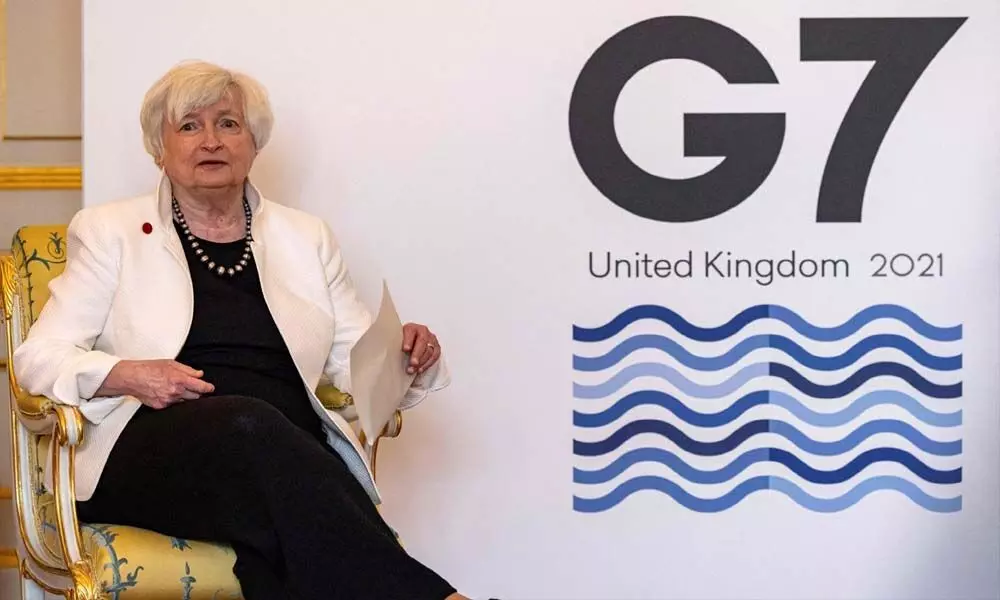Is it wrong way of fixing corporate taxes?
Global tax competition serves a useful purpose; Simpler rules would be a better way to fight abuse
image for illustrative purpose

As things stand, the global tax proposals recently announced by the Group of Seven's (G-7) finance ministers and endorsed at the weekend's G-7 summit raise more questions than answers. The group's governments say they've agreed on two linked initiatives - first, to set a common minimum corporate tax rate of at least 15 per cent; second, to apportion the profits made by some big multinationals according to where their goods and services are sold. Whether this plan ever goes forward and what exactly it would mean if it did are far from clear, but the deal looks suspect.
The proposals can be seen as a bargain struck by the US on one side and the rest of the G-7 on the other. Several European governments have argued that they deserve a greater share of the profits that America's leading digital-services companies make in their markets. They've developed various new taxes to tap this pool, and the US has threatened tariffs in response. The G-7 announcement suggests that the US is willing to let other countries tax its multinationals' profits. In return, the other governments will help the Biden administration raise the domestic corporate tax rate by limiting the freedom of other countries to set rates low enough to draw capital away from the US
Two questions should be asked about this arrangement. First, will it do what governments intend, and raise more revenue? Second, and more important, is it good for their respective producers and consumers? The answers will depend on the fine print. Before dividing up the spoils, complex rules will be needed to specify which firms will be affected, how their profits will be measured, and how the new minimum rate will be applied. Before even getting to this, many more countries will have to sign on. Some of them, notably Ireland, have prospered thanks to very low corporate tax rates. They might give way to pressure, but they won't be eager. In the end, the whole plan could come to nothing. But suppose it goes ahead on the terms indicated. Has Biden struck a good bargain?
At first sight, it doesn't look that way. Treasury Secretary Janet Yellen says the outline agreement to adjust the allocation of profits among the US and its trading partners will be "largely" revenue-neutral for the US- but this is a surprising claim. Again, everything depends on matters still unresolved, and some of these are more than mere details. (Within days of applauding the tentative new agreement, U.K. finance minister Rishi Sunak was calling for the finance industry to be excluded from the base-apportionment formula.) The world's biggest and most successful multinational enterprises are disproportionately American, suggesting that the US would lose more from these tax-base changes than it would gain. Europe's finance ministers had seemed to be working on this assumption.
A separate issue is whether the proposed new minimum would make it easier for the US to gather more corporate tax with its own higher rate - 28 per cent, as Biden has proposed, or 25 per cent, as some in Congress want - relative to the current 21 per cent. It's hard to see why it would. If the US sets its profits tax at 28 per cent and others remain free to set theirs at 15 per cent (only slightly higher than Ireland's current rate), then Biden's preferred policy will still put US-based producers at a substantial disadvantage.
On the face of it, the US seems to be giving up something substantial for little in return - and the rest of the G-7 deserves to be congratulated on a notable win.
The deal's advocates would respond that a much bigger issue is at stake, and that everybody's interests are served by a global compact to reduce the "race to the bottom" in corporate taxes. It's true that corporate tax collections have fallen worldwide in recent years. But this argument goes only so far. As noted, a global minimum as low as 15 per cent might do little or nothing to support rates as high as 28 per cent.
More fundamentally, the goal itself needs to be better framed. The crucial point is that tax competition isn't bad in its own right. To the contrary, it's good that jurisdictions compete to provide public services at least cost to taxpayers, and to lure new investment and high-paying jobs. Neither states within the US nor the members of the European Union have chosen to stamp out this kind of rivalry. Nor should they.
Admittedly, corporate taxes pose a particular challenge. Because capital and intangible assets are highly mobile, they lend themselves to pure tax arbitrage - which strives to allocate profits not for greater economic efficiency, but merely to cheat the tax collector. This argues for closer cooperation in sharing data and simpler rules that are easier to enforce. But establishing floors for particular tax rates, especially as part of a plan that makes international tax arrangements even more complicated, isn't the answer. Regardless of the proposed global minimum, corporate tax arbitrage will still be profitable if the rules create loopholes that smart accountants can exploit.
Such arbitrage is indeed a burden on ordinary taxpayers. Simpler tax laws, and more effective global cooperation, are certainly desirable. But the dream of ending tax competition by putting a worldwide floor under the permissible levy on profits - even supposing this were possible - is not. (Bloomberg)

